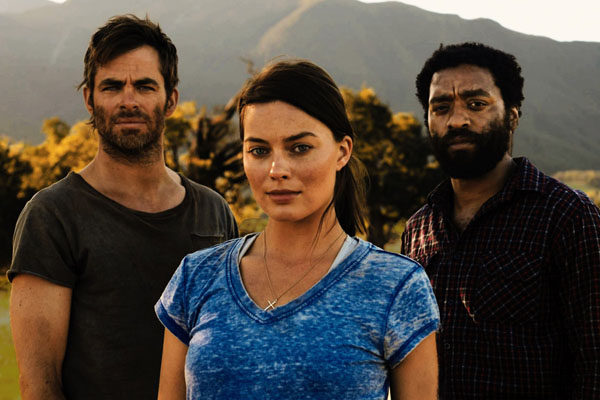“Very loosely adapted from Robert C. O’Brien’s posthumous 1973 novel of the same name, Z for Zachariah introduces a world on the brink of human extinction,” writes David Ehrlich for Little White Lies. “Ann Burden (Margot Robbie, confirming the promise of her scene-stealing performance in The Wolf of Wall Street) is a naïve but resourceful survivor who appears to have the ruins of America to herself…. Directed by Craig Zobel, who was last polarizing Sundance audiences with Compliance in 2012, Z for Zachariah is a surprisingly logical followup for a filmmaker so fascinated by the frailty of human trust. When Ann first encounters John (Chiwetel Ejiofor, brilliant as ever), a gravely ill engineer who owes his survival to an amusingly top-heavy hazmat suit, a natural suspicion develops between them. Of course, it isn’t long until other natural feelings develop between them… But nothing comes easy to the characters in this film, especially once an ‘aw shucks’ country boy named Caleb (Chris Pine) shows up to spark a love triangle that lacks a right angle.”
Mike D’Angelo at the Dissolve: “John and Caleb trade suspicious and smug looks (respectively), and Zobel twice suggests, via coy framing or unreadable facial expressions, that one man is about to murder the other, claiming Ann as his prize. This is just about the least interesting way to explore the end of the world, which is presumably why O’Brien eschewed it. The book as written could have made a fascinating film; why Zobel and Modi made it more banal is a mystery.”
For the AV Club‘s A.A. Dowd, Z for Zachariah “actually feels like a ruralized, slightly watered-down remake of a much older movie, the 1959 Harry Belafonte vehicle The World, the Flesh and the Devil,” which, in “its dated and heavy-handed way… remains a more thoughtful and provocative movie—one in which a black man and white woman struggle to entertain the possibility of a life together, for fear of violating the codes of a society that no longer exists. Made in a supposedly more enlightened era, Z For Zachariah deals more subtly with race—it’s only acknowledged once, in what plays like a laugh line for Ejiofor—but it also largely sacrifices any social subtext, beyond a half-baked science-versus-faith division. Zobel, meanwhile, directs the whole thing like a Nicholas Sparks adaptation, piling on the dewy bucolic imagery and tasteful, romantic sex scenes.”
For Variety‘s Scott Foundas, this is “a movie that feels stranded somewhere between serious artistic ambition and the dystopian franchise-building of The Hunger Games, Divergent, et al.” The Hollywood Reporter‘s Todd McCarthy finds that it “effectively sets all its surface parts in motion but, crucially, doesn’t sufficiently develop that turbulent undercurrents of tension and intrigue that are called for in the hothouse circumstances.”
“Trying to strip away the grandeur of the post-apocalyptic drama to get to the heart of our shared failings, Zobel can’t help but stumble over a few genre clichés,” grants Tim Grierson in Screen. “But the resolution does a good job of leaving us without many answers. We walk away from the experience wondering if humanity can ever outrun the foibles that make us human in the first place, even when our very survival hangs in the balance.”
More from Jason Gorber (Twitch), Drew McWeeney (HitFix) and Dan Mecca (Film Stage, B).
Updates: “Abetted by DP Tim Orr, Zobel can offer up well-framed pastoral landscapes by the score, and he works to introduce tension at an unexpected moment’s notice,” writes Filmmaker‘s Vadim Rizov. “When Loomis and Caleb go turkey hunting, the latter’s behind, and the camera’s just off-axis enough to make it unclear whether he’s aiming at animal or man. Often similarly sharp and sudden in introducing or upending established dynamics, Zachariah‘s undone by a classic sci-fi problem: the premise may be neat, but moment-to-moment execution is comparatively underwhelming.”
“When it focuses on the fraught interplay between Anne and John, Z for Zachariah is wonderful; I could have watched these small human moments, alternately tense and tender, between Ejiofor and Robie forever.” But Vulture‘s Bilge Ebiri finds that Caleb’s arrival “turns a moody, absorbing portrait of a compromised relationship into something more schematic and melodramatic.”
More from Rodrigo Perez (Playlist, B-) and Ibad Shah (Indiewire, B). And Indiewire hands its Sundance questionnaire to Zobel.
Updates, 1/31: “There’s a lot of bare symbolism and unspoken feelings, but not a lot of action,” writes Jordan Hoffman for the Guardian. And “what begins as a deeply philosophical survivors’ story eventually deflates into a soap opera-ish love triangle. While these story points are perhaps the easiest to relate to, they ultimately aren’t that interesting. Yet the depth of the world and all three of the performances are just enough to stay through from A to Z.”
“Unfortunately, there isn’t a beat, turn, or plot development that one can’t foresee miles ahead,” finds Sam Fragoso at RogerEbert.com. But for Nicholas Bell at Ioncinema, Z is “exactly the type of intelligently written and well-performed low key genre film we rarely see any more, adult material that doesn’t rely on bombastic melodrama.”
Paula Bernstein talks with cinematographer Tim Orr for Indiewire; Ioncinema‘s Eric Lavallee interviews Zobel (more from Filmmaker) and producer Sophia Lin; and Jada Yuan talks with Ejiofor and Robbie for Vulture.
Update, 2/23: Jack Giroux talks with Zobel for the Film Stage.
The Sundance 2015 Index. For news and tips throughout the day every day, follow @KeyframeDaily. Get Keyframe Daily in your inbox by signing in at fandor.com/daily.




